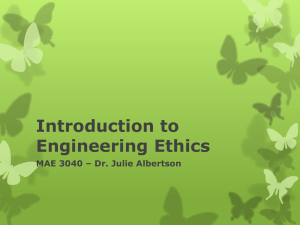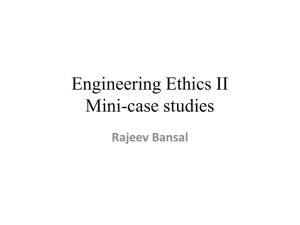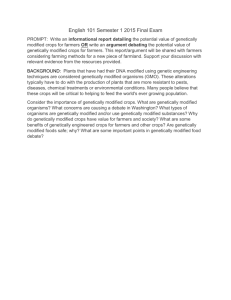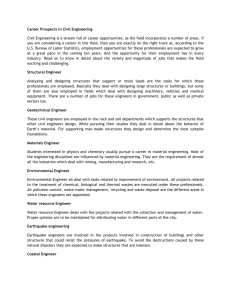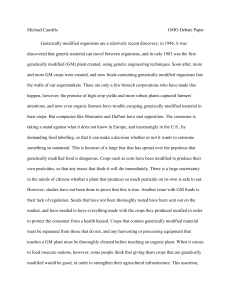Writing Assignment 3
advertisement
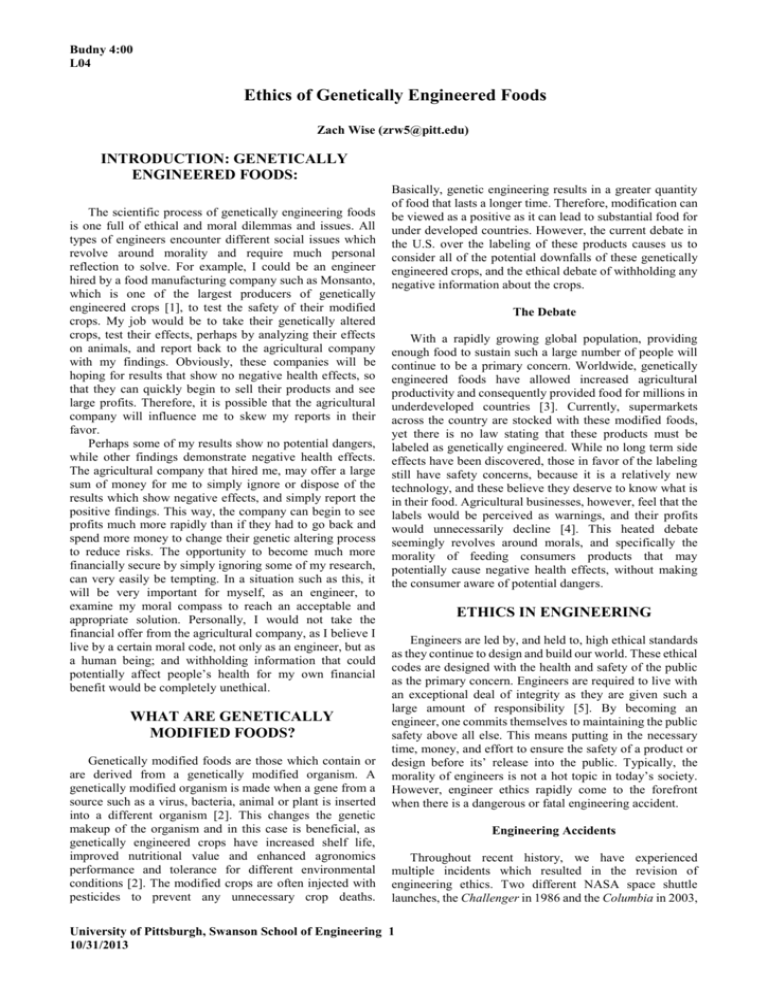
Budny 4:00 L04 Ethics of Genetically Engineered Foods Zach Wise (zrw5@pitt.edu) INTRODUCTION: GENETICALLY ENGINEERED FOODS: The scientific process of genetically engineering foods is one full of ethical and moral dilemmas and issues. All types of engineers encounter different social issues which revolve around morality and require much personal reflection to solve. For example, I could be an engineer hired by a food manufacturing company such as Monsanto, which is one of the largest producers of genetically engineered crops [1], to test the safety of their modified crops. My job would be to take their genetically altered crops, test their effects, perhaps by analyzing their effects on animals, and report back to the agricultural company with my findings. Obviously, these companies will be hoping for results that show no negative health effects, so that they can quickly begin to sell their products and see large profits. Therefore, it is possible that the agricultural company will influence me to skew my reports in their favor. Perhaps some of my results show no potential dangers, while other findings demonstrate negative health effects. The agricultural company that hired me, may offer a large sum of money for me to simply ignore or dispose of the results which show negative effects, and simply report the positive findings. This way, the company can begin to see profits much more rapidly than if they had to go back and spend more money to change their genetic altering process to reduce risks. The opportunity to become much more financially secure by simply ignoring some of my research, can very easily be tempting. In a situation such as this, it will be very important for myself, as an engineer, to examine my moral compass to reach an acceptable and appropriate solution. Personally, I would not take the financial offer from the agricultural company, as I believe I live by a certain moral code, not only as an engineer, but as a human being; and withholding information that could potentially affect people’s health for my own financial benefit would be completely unethical. WHAT ARE GENETICALLY MODIFIED FOODS? Genetically modified foods are those which contain or are derived from a genetically modified organism. A genetically modified organism is made when a gene from a source such as a virus, bacteria, animal or plant is inserted into a different organism [2]. This changes the genetic makeup of the organism and in this case is beneficial, as genetically engineered crops have increased shelf life, improved nutritional value and enhanced agronomics performance and tolerance for different environmental conditions [2]. The modified crops are often injected with pesticides to prevent any unnecessary crop deaths. Basically, genetic engineering results in a greater quantity of food that lasts a longer time. Therefore, modification can be viewed as a positive as it can lead to substantial food for under developed countries. However, the current debate in the U.S. over the labeling of these products causes us to consider all of the potential downfalls of these genetically engineered crops, and the ethical debate of withholding any negative information about the crops. The Debate With a rapidly growing global population, providing enough food to sustain such a large number of people will continue to be a primary concern. Worldwide, genetically engineered foods have allowed increased agricultural productivity and consequently provided food for millions in underdeveloped countries [3]. Currently, supermarkets across the country are stocked with these modified foods, yet there is no law stating that these products must be labeled as genetically engineered. While no long term side effects have been discovered, those in favor of the labeling still have safety concerns, because it is a relatively new technology, and these believe they deserve to know what is in their food. Agricultural businesses, however, feel that the labels would be perceived as warnings, and their profits would unnecessarily decline [4]. This heated debate seemingly revolves around morals, and specifically the morality of feeding consumers products that may potentially cause negative health effects, without making the consumer aware of potential dangers. ETHICS IN ENGINEERING Engineers are led by, and held to, high ethical standards as they continue to design and build our world. These ethical codes are designed with the health and safety of the public as the primary concern. Engineers are required to live with an exceptional deal of integrity as they are given such a large amount of responsibility [5]. By becoming an engineer, one commits themselves to maintaining the public safety above all else. This means putting in the necessary time, money, and effort to ensure the safety of a product or design before its’ release into the public. Typically, the morality of engineers is not a hot topic in today’s society. However, engineer ethics rapidly come to the forefront when there is a dangerous or fatal engineering accident. Engineering Accidents Throughout recent history, we have experienced multiple incidents which resulted in the revision of engineering ethics. Two different NASA space shuttle launches, the Challenger in 1986 and the Columbia in 2003, University of Pittsburgh, Swanson School of Engineering 1 10/31/2013 Zach Wise caused public concern over the importance given to the safety of these shuttles. The Challenger had noticeable design flaws in its boosters, yet these concerns were seemingly ignored as the launch proceeded as planned, and soon later a tragic and fatal malfunction occurred. The Columbia also had a design flaw that was noticed during its launch, yet because the launch was successful, this flaw was also ignored. Unfortunately, the shuttle was unable to survive its re-entry into Earth’s atmosphere and it was destroyed [6]. Tara Hoke, the assistant general counsel for the American Society of Civil Engineers, reflected on these events with great disappointment and concern. “While the circumstances of each event have been greatly simplified here, in both cases the tragedies may have been averted if sound engineering judgment had prevailed. The events surrounding the shuttle disasters encapsulate the range of considerations that can compromise an engineer’s commitment to safety” [6]. The engineers at these space shuttle launches faced numerous pressures which prevented them from acting on their concerns and averting the terrible accidents. These pressures can include cost and scheduling concerns, pressure from employers to make decisions based on their best interests, and an inherent culture that rewards consistency rather than dissonance [5]. When facing these issues, engineers must refer to their morals and specifically their engineering codes of ethics. large agricultural company to disregard data about genetically engineered crops being potentially dangerous. Applying the Codes Professional engineers must take these vital codes of ethics, and apply them in their daily jobs. In the hypothetical case of the bribing of the engineer, one must closely examine the code of ethics to see the clear and appropriate way to respond. The previously presented excerpt from the Chemical Engineers Code of Ethics provides a clear description of how the engineer must respond to the financial offer from the agricultural company. As a chemical engineer, he is mandated to hold paramount the safety and well-being of the public. This means revealing all studies which contain information about potential dangers. As the code states, an engineer must “present information only in an objective and truthful manner” [8]. This makes it obvious that the engineer has an inherent duty to reject the large financial offer from the agricultural company and publicly release the studies showing potential dangers of genetically modified crops. This hypothetical engineer must make the honest, but perhaps more difficult, decision to forgo personal gain, in favor of public safety. By becoming a professional engineer, he has agreed to exhibit the values presented in both the NSPE code and the code of his specific engineering field, which in this case may be the Chemical Engineering Code of Ethics. Both codes mandate that the engineer stay faithful to his public duty. Withholding information about the potential dangers of these modified crops could cause serious public health problems in the future. In order to be faithful and honor his job as an engineer, these codes demonstrate that he must release his findings, which then may lead to further testing and experimentation and consequently the prevention of possible health dangers. Engineering Code of Ethics All engineers are bound by a code of ethics set forth by the National Society of Professional Engineers (NSPE). This code demonstrates the highest standard of honesty and integrity that professional engineers are expected to exhibit. The primary concern of the code is that engineers put the health, safety and general welfare of the public above all else [7]. This means that engineers must be committed to serving the public even if this results in circumstances that are cumbersome or personally costly. The code continues to go into great detail about the honesty and faithfulness that an engineer must display, as well as how the services of an engineer must be in their specific field of expertise. Each of these specific engineering fields also have their own codes of ethics, which professional engineers also must abide by and strive to achieve. CURRENT STATE OF GENETICALLY MODIFIED FOODS The potential harm of genetically modified crops is a controversy within itself. While certain animal tests show that there are health effects, tests done by the agriculture companies show no negative effects [9]. This creates credibility concerns over the validity of their tests. Clearly, agribusinesses have potentially large financial gains if they provide testing that shows no dangers or risks, as they could sell their products freely. This, however, would be in clear violation of the values of integrity and honesty set forth in the NSPE Code of Ethics. Furthermore, there are other reports of health issues that are believed to be related to these modified crops. For example, foodborne diseases, such as soya allergies, have increased recently in the U.S. and UK. There are also reports of cotton handlers in India who developed skin allergies after handling this genetically altered crops. In addition, studies have revealed that certain modified corn products contain a protein which alters the immune system [9]. The Union of Concerned Scientists states, “GE crops do have the potential to cause a variety of health problems and environmental impacts” [10]. Specific Field Codes Genetic engineers of food and crops are typically grouped under the much broader category of chemical engineers. The American Institute of Chemical Engineers set forth their own code of ethics which restates and reinforces many of the core values of the NSPE code of ethics. One aspect of the code states that the engineers must “Formally advise their employers or clients if they perceive that a consequence of their duties will adversely the present of future health or safety of their colleagues of the public” [8]. This statement is pertinent to the original scenario that was set up, involving the engineer who is being bribed by a 2 Zach Wise fallen short of expectations, and in some cases have caused serious problems” [10]. They continue on to say that policy makers must expand research funding as well as support the labeling of modified foods [10]. I fully agree that his is the only answer to the bevy of controversial health issues that surround genetically engineered foods, until further conclusive testing is done. Unresolved Issues While scientists are currently debating the safety of genetically engineered foods, one thing is certain; questions about the safety are far from resolved. Doug GurianSherman, senior scientist with the Food and Environment Program at the Union of Concerned Scientists, recently said, “Because of the greater capacity to bring unknown quantities into the food supply, I’m of the school that says it has somewhat higher potential for risk” [11]. GurianShurman is concerned with data from the Center for Disease Control and Prevention, which shows an 18% increase in reported food allergies between 1997 and 2007 [11]. Currently, in the United States, these modified foods can be sold without any labeling specifying that they have been modified. With such uncertainty revolving their potential effects, these products should, at the very minimum be labeled as genetically modified, and perhaps even removed from stores until further tests clarify their potential dangers. As the NSPE Code of Ethics states, “Engineers shall avoid the use of statements containing a material misrepresentation of fact or omitting a material fact” [7]. The omission of a “genetically modified” label on these products completely disregards the code of ethics. As consumers, we should not put up with this complete lack of concern over our future health from agribusiness companies such as Monsanto, who are much more concerned about their profits. References [1] A. Kaur, R. Kohli, P. Jaswal. (2012). “Genetically Modified Organisms: An Indian Ethical Dilemma.” J Agric Environ Ethics. (Print article). pp. 621-626 [2] O. V. Singh. (2010). “Regulation and Safety Assessments of Genetically Engineered Food.” Studies in Ethics, Law, and Technology. (Print article). Vol. 4, no 2. pp. 1-11 [3] B. Maghari, A. Ardekani. (2011). “Genetically Modified Foods and Social Concerns.” Avicenna Journal of Medical Biotechnology. (Print article). Vol. 3, no 3. pp. 109-115 [4] R. Schurman, W. A. Munro. (2010). “Fighting for the Future of Food: Activists versus Agribusiness in the Struggle over Biotechnology.” Family and Consumer Sciences. (Print article). Vol. 104, no 1. pp. 51-52 [5] J. Yarmus, (2010) “Ethics in Professional Engineering: Leadership through Integrity” Leadership and Management in Engineering. (Print article). pp. 1-3 [6] T. Hoke, (2011). “The Importance of Engineering Ethics.” Civil Engineering. (Print article). pp. 42-43 [7] (2007). “NSPE Code of Ethics for Engineers.” National Society for Professional Engineers. (Online article). http://www.nspe.org/Ethics/CodeofEthics/index.html [8] (2013). “Code of Ethics.” American Institute of Chemical Engineers. (Online article). http://www.aiche.org/about/code-ethics [9] S. Bansal, B. Ramaswami. (June 2010). “Labels for GM Foods: What can They Do?” Economic and Political Weekly. (Print article). pp. 1-10 [10] (2012). “Genetic Engineering in Agriculture.” Union of Concerned Scientists. (Online article). http://www.ucsusa.org/food_and_agriculture/our-failingfood-system/genetic-engineering/ [11] R. Dahl. (Sep. 2012). “To Label or Not to Label: California Prepares to Vote on Genetically Engineered Foods.” Spheres of Influence. (Print article). Vol. 120, no 9. pp. 359-361 CONCLUSION: LABELING IS A MUST It is safe to say that the primary concern of all engineers is, and should be, the potential negative consequences that their engineering processes may have on public safety. In regards to genetically modified foods, there is too much uncertainty surrounding their possible future health consequences for me to comfortably say that it is ethically correct to sell these products to the common person, without even informing them of how the product was made. I never want to be the guinea pig of a new product that could potentially cause harm, and consumers have the right to know if their food has been modified, and in what way it has been modified. Personally, I am very conscious about my health and always try to avoid any foods that are detrimental to my body. I understand and respect the professionals that have not found any long term health effects. However, there are certain things that I feel should be taken with extra caution; and health is one of these things. Agricultural companies must look at engineering codes of ethics, realize they are potentially putting the public at risk, and change their ways. The Union of Concerned Scientists state, “We see that the technology has potential benefits, but we are critics of its commercial application and regulation to date. Its applications in agriculture so far have ACKNOWLEDGEMENTS I would like to thank my writing instructor, Dan Mcmillan, for working with me through this assignment. I would also like to thank Sam Sherlock for editing this paper for me. 3
